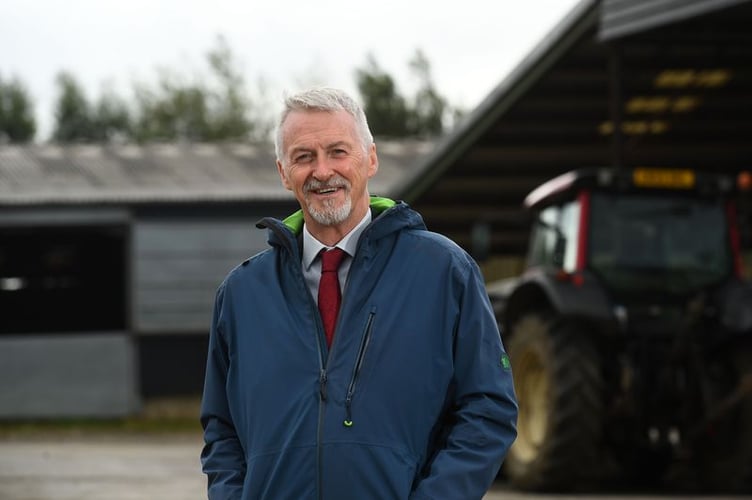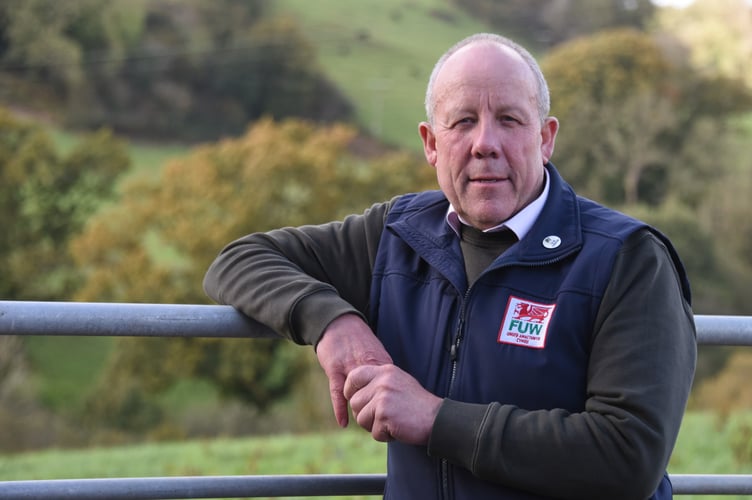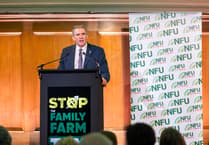The Welsh Government has today released its final version of the controversial Sustainable Farming Scheme (SFS).
The initial proposals last year led to mass protests across Wales from farmers, angry at the stipulations, including a requirement to have 10 per cent tree cover.
Announcing the new-look scheme on Tuesday, Deputy First Minister with responsibility for Climate Change and Rural Affairs, Huw Irranca-Davies said: "This scheme is the product of extensive collaboration.
“We've listened carefully to farmers across Wales and revised our approach to ensure it works for the agricultural industry and meets our shared responsibilities to the natural world around us.
"We recognise this involves change. This Scheme is fundamentally different from the Basic Payment Scheme, but absolutely necessary for the long term success of farming, food production and the environment.”

The Scheme will work as follows:
The Sustainable Farming Scheme will begin on 1 January 2026 with the application form for the Universal layer of the scheme being available on the Single Application Form (SAF) via Rural Payments Wales (RPW) Online from March through to 15 May each year.
An annual Universal Payment will go to farmers joining the Scheme who follow the Scheme Requirements including a set of Universal Actions . Many of these actions will be familiar to farmers in Wales, whether beef, dairy, arable, upland, lowland, extensive or intensive.
The Scheme has been made less complex with fewer administrative requirements. The number of Universal Actions has been cut and built on the tried and tested processes and systems of Rural Payments Wales (RPW).
The combination of the Universal, Optional and Collaborative layers provides a long-term stable framework to support sustainable farming in Wales. It gives stability through the Universal layer, and additional support to those who want to do more through Optional and Collaborative Actions.
All farmers entering the Scheme will need to complete an opportunity plan for woodland and hedgerow creation in the first year of entry into the Scheme. They will need to demonstrate progress towards their plan by the end of the 2028 scheme year.
Support will be provided for tree and hedgerow planting in the Optional Layer, including for agroforestry, and there will be a higher payment rate for tree planting during the first 3 years of the Scheme.
Farmers are not expected to plant trees on their most productive land – they will decide where to plant, with clear advice and guidance to ensure the right tree in the right place.
Farmers in the Scheme will need to have at least 10% of their land actively managed as habitat, to benefit biodiversity and support nature recovery alongside food production. A range of temporary habitat options are available to choose from if farmers need to do more to meet the 10% requirement.

The Deputy First Minister, concluded: “This represents a landmark moment for Welsh agriculture, with farmers playing a central role in our food security, environmental protection, and maintaining the distinct cultural heritage and language of rural Wales.
“Our ambition is to see a thriving and confident agriculture industry in Wales, that is built around innovation and growth, to rise to the challenges we face and make most of the opportunities available.
“We hope the majority of farmers join the Scheme to help us realise this ambition. We firmly believe it will provide much needed stability whilst helping farm businesses to be more resilient, productive and sustainable.”
Unions react
Speaking in response to the publication, FUW President Ian Rickman said: “Since the initial Brexit and Our Land consultation in 2018, the FUW, its officials and staff have invested a remarkable amount of resources into lobbying, negotiating and challenging the Welsh Government in order to try and secure a workable Scheme for the future of our thriving, sustainable family farms and food production across Wales.

“During the past year alone, we have attended in excess of 60 meetings with the Welsh Government totalling over 300 hours of negotiations. I can assure FUW members and the wider agricultural community that we have left no stone unturned over the past seven years in our ambition to secure a viable post-Brexit farm support framework.
“The scheme published today represents this prolonged period of negotiation, marking a generational milestone for the future of Welsh agriculture.
“To highlight some of the key successes, we have secured a total budget for the Universal Baseline Payment and BPS taper combined of £238 million, providing workable payment rates and much needed stability for the sector. This includes the provision of universal payments for common land rights holders.
“We have retained and strengthened the application of capped and redistributive payments, a longstanding policy position for the FUW and one that maximises the amount of money going to typical Welsh family farms and rural communities.
“We have also reduced the number of Universal Actions from 17 to 12 with added flexibility and simplification, including exemptions for tenants and the removal of the unworkable 10% tree cover Scheme Rule.
“However, we accept that the Scheme is not perfect. The 10% habitat Scheme Rule will be a concern for many as will the management requirements that will apply on those areas despite these being less prescriptive than previous agri-environment schemes.
“We also appreciate there will be concerns raised around the Scheme-level ambition to plant 17,000 hectares of trees by 2030, the potential year-to-year fluidity of the payment rates and the shorter BPS transition, which will now fall to 60% in 2026 and reduce by 20% per year thereafter. We have been consistent in our calls for the BPS transition to follow five equal reductions starting at 80% in 2026 as was initially proposed by the Welsh Government.
“FUW members can be assured that the union made its position absolutely clear on these areas throughout the negotiations. I am confident that the Union has done everything in its power to represent you and your businesses throughout this process.
“This Scheme will be different to what we have historically considered as direct farm support or subsidies. I therefore urge all Welsh farmers to consider the Scheme requirements and payment rates in the context of your own businesses.”
NFU Cymru has raised concerns over the decision to slash the Basic Payment Scheme (BPS) by 40 per cent for 2026, saying this overshadows much of the positive work undertaken to improve the new scheme.
Welsh Government has confirmed its intention to reduce the BPS to 60% of current payment levels in 2026, having previously reassured farmers that there would be no ‘cliff edge’ in funding through the transition to new schemes.

NFU Cymru President Aled Jones said: “This unwelcome decision by Welsh Government is extremely worrying for farmers in Wales who had previously been informed that those opting not to enter the new Sustainable Farming Scheme in 2026 would receive 80% of their BPS. Farming businesses have forward planned on this basis.
“This development is even more of a blow given significant guidance and technical detail is yet to be published which farmers need if they are to make informed decisions about whether to enter the scheme from 1 January 2026. “With harvest well underway and next year’s cropping and livestock purchases already in motion, many farmers will not be able to pivot their business to join the new scheme from January.
“Farming families are also grappling with difficult conversations and decisions on how to restructure their businesses to address the changes being forced upon them by the introduction of the UK Government’s family farm tax from April 2026.With Welsh Government now slashing the first year of the tapered transition from the BPS, many will feel they are now stuck between a rock and a hard place.”
NFU Cymru President Aled Jones said: “The Deputy First Minister has listened and acted on a number of our concerns. Changes secured following NFU Cymru lobbying have addressed many of the ‘thorny’ issues we have grappled with; the 10% Tree cover scheme requirement has been removed; the unique circumstances of our tenants and common land rights holders have been considered; the number of universal actions (UAs) have been consolidated and positive changes have been secured to a number of the conditions attached to these UAs.

“Despite this, the level of detail, constraints, administration, costs and bureaucracy attached to the SFS is significant and far greater than anything seen before. We remain deeply worried about the burden this scheme will place on a sector low in confidence and already dealing with a mountain of red tape.
“NFU Cymru has long highlighted the need for the SFS to provide at least the same level of stability to farm businesses, our rural communities and the supply chain as the BPS does currently. We are pleased that Welsh Government has confirmed a social value payment recognising the wider benefits provided by farming.
“However, without publication of Welsh Government’s impact assessment and modelling, it is impossible to understand the impact the scheme will have on farm businesses and the supply chain. This information must be made available as soon as possible and there must be a commitment from Welsh Government to change the scheme if certain sectors or areas are disadvantaged, or the scheme is shown to hamper and harm our ambition to continue to grow the Welsh food sector from farm to fork.”
Environmentalists concerned
Wildlife Trusts Wales has said the finalised scheme fails to provide ‘immediate action for nature recovery’, saying it falls short in addressing the ‘Climate and Nature Crises’.
The trusts says it welcomes the move towards a whole-farm approach with the goal of making Welsh farming more sustainable. However, the details released only cover the Universal Tier, which appears to maintain the status quo. It falls short of addressing the pressing nature and climate challenges we face today.
The trusts add: “Welsh farming is currently unsustainable—both economically and environmentally.
“Over the past decade, the number of farms has decreased, resulting in 9,000 job losses. Farming continues to be the primary driver of biodiversity loss and greenhouse gas emissions in Wales.
“The SFS should be a vehicle for change, enabling sustainable food production and transitioning to sustainable land management.
“Financial support and recognition through the Social Value Payments for carbon storage, air quality, and recreation access are a step in the right direction. “We welcome the tapering of the Basic Payment Scheme (BPS), which has offered poor value for money.
“These tapered funds will now go to the proposed Options and Collaborative tiers and they have the potential to support nature friendly farming, but details of these tiers are still lacking.
“We commend the Welsh Government for its transparency and commitment to engaging all stakeholders throughout the SFS review process, including the Roundtable and other forums over the past year.
“Wales is one of the most nature-depleted countries in the world, with one in six species now at risk of extinction.
“Farming, which covers over 80% of Welsh land, is a primary driver of this decline but also where the greatest potential for recovery lies.
“To reverse this trend, farming must change whilst supporting sustainable food production and viable livelihoods. The SFS has the potential for this if sufficient budget is secured for the Options and Collaborative tiers. The SFS should prioritise farmers who are already managing land for nature and incentivise those transitioning to more sustainable practices.”
The trusts went on to raise concerns over ‘diluted proposals’ including the removal of mandatory pond requirements on farms and action to restore peatland, the change to 10 per cent tree cover, to a tree planting plan and no firm commitment to reducing pesticide use.
Rachel Sharp, Director of Wildlife Trusts Wales, said: “While we welcome elements of the Sustainable Farming Scheme, we remain deeply concerned that the final version will not adequately address the climate and nature crises.
“Welsh farming is in crisis—fewer farms, fewer jobs, and increasing environmental damage. We need to see an increased budget for the SFS, specifically for the Options and Collaborative tiers, to help farmers transition to nature-friendly farming practices.”





Comments
This article has no comments yet. Be the first to leave a comment.